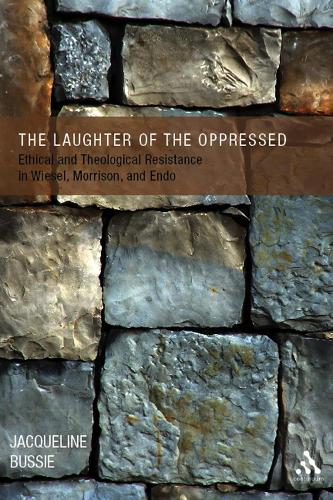
The Laughter of the Oppressed: Ethical and Theological Resistance in Wiesel, Morrison, and Endo
(Paperback)
Available Formats
Publishing Details
The Laughter of the Oppressed: Ethical and Theological Resistance in Wiesel, Morrison, and Endo
By (Author) Dr. Jacqueline A. Bussie
Bloomsbury Publishing PLC
T.& T.Clark Ltd
15th December 2007
United Kingdom
Classifications
Tertiary Education
Non Fiction
Theology
233
Physical Properties
Paperback
224
304g
Description
Jacqueline Bussie's book tackles the following unanswered questions: What is the theological and ethical significance of the laughter of the oppressed And what does it mean to laugh at the horrible--to laugh while one suffers The majority of ethical philosophical theory and western theology (e.g. Augustine, St. John Chrysostom, Oecolampadius, Reinhold Niebuhr) maintains that laughter is nihilistic and irresponsible, especially if occurring within tragic circumstance. However, she argues that the dominant social location of these theologians and theorists has led to a gap in inquiry, to a failure to consider laughter "from below." For Judeo-Christian theology, The Laughter of the Oppressed explores uncharted terrain. This book broadens the theological lens to examine the multicultural, modern historical fiction of Elie Wiesel, Toni Morrison, and Shusaku Endo as case studies. In these authors' well-respected texts, Gates of the Forest, Beloved, and Silence, we discover the laughter of the Jews during the Holocaust, the laughter of African Americans both slave and free, and the laughter of the persecuted religious minority of Japanese Christians. These texts, in dialogue with voices from within and beyond their traditions, help us construct a theology of laughter. Bussie's book concludes that laughter functions as invaluable ethical and theological mode of resistance in the face of radically negating oppression that has ruptured both language and traditional belief. The Laughter of the Oppressed not only interrupts the banality of evil and the dualism of faith and doubt, but also deconstructs the dominant consciousness. Such laughter challenges theology to rearticulate the relationships between God and evil, theology and theodicy, theology and language, paradox and faith, tragedy and hope, and oppression and resistance.
Reviews
Political jokes arise in dictatorships and their laughter is liberating oppressed and silenced people. They are nothing less than a resonance of the laughing God in heaven. "The Lord shall have them in derision." (Ps 2,4). The arrogance of power is ridiculous because God is God. I read this fascinating study with growing admiration. It is a masterpiece and a great contribution to every liberating theology. -- Jurgen Moltmann
Jacqueline Bussie reads familiar texts with a keen theological eye and provides fresh and innovative insights into these literary classics. With exquisite literary sensibility and bold theological imagination she helps her readers to understand how genuine laughter emerges from the depths of suffering. This is theological writing of the highest order - intelligent, faithful, and deeply moving. -- Ronald F. Thiemann, Bussey Professor of Theology, Harvard Divinity School
This text is an important theological interpretation of the meaning of laughter for the oppressed. I strongly recommend it. -- James H. Cone, Charles Augustus Briggs Distinguished Professor of Systematic Theology Union Theological Seminary New York, N.Y.
Bussie listens deeply to the voices of people traditionally marginalized to discover how they have given expression to the paradox of 'colliding narratives' and responded creatively to tragic suffering...The Laughter of the Oppressed...is indispensable for those concerned with theodicy and the problem of suffering, the theology of the cross, liberation theologies, and the use of fiction as a theological resource. -- Karen Teel * Catholic Books Review *
Author Bio
Dr. Jacqueline Bussie is the Director of the Forum on Faith and Life and Associate Professor of Religion at Concordia College-Moorhead.
